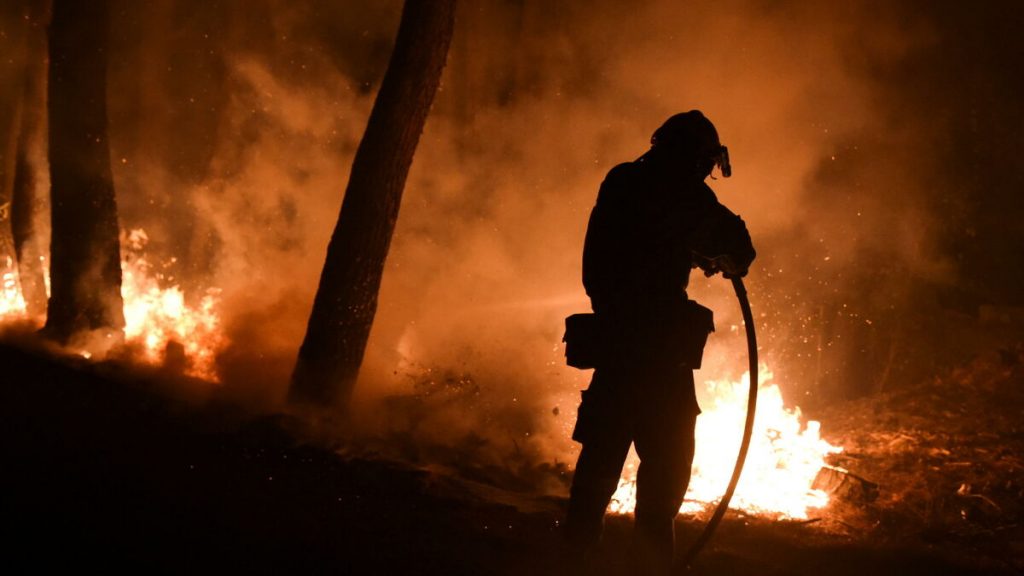
Fires: Greece is still burning, Turkey is helped by rain
Violent fires continued on Saturday to devour thousands of hectares of forests and homes in Greece. A new record in scorched areas was broken on the eleventh day of this “nightmare summer”, according to the Greek prime minister, when the situation appeared to be stabilizing in neighboring Turkey.
On both sides of the Aegean, thousands of residents and tourists have been evacuated in recent days, many by sea, in the face of rising flames fueled by rising temperatures. Eight people have died and dozens have been hospitalized in the 200 fires that have ignited southern Turkey for a week. Two deaths to be regretted in GreeceIn addition to about two dozen wounded, including two volunteer firefighters, were taken to hospital in critical condition.
With mercury fluctuating between 40 and 45 degrees, Greece and Turkey are going through an exceptional heat wave, which experts unequivocally associate with climate change.
If the situation appears to be improving under the influence of rains on the Turkish coast, where 13 fires have remained active this Saturday over the past 200 days, fires have been on the rise in Greece, still fueled by winds in some places.
Fires have destroyed more than 30,000 hectares in recent days in Greece, according to the European Forest Fire Information System, a European Union-backed body.
“Summer Nightmare”
At least 1,450 Greek firefighters, aided by reinforcements from other countries, continued their fierce battle against five major fires north of Athens, on the island of Evia, 200 kilometers east of the capital, and against three fires on the Peloponnese peninsula in the west, according to the firefighters. . Greek authorities counted 154 fires, 64 of which were still active Friday evening.
“When this nightmare summer ends, we will repair all the damage as quickly as possible,” Prime Minister Kyriakos Mitsotakis vowed Saturday morning at the Athens Fire Department.
North of Athens, the violent disaster continued to advance strongly towards the east and Lake Marathon, the capital’s largest water reserve, after causing the evacuation of dozens of localities. Thick fumes and a pungent odor spread again in the capital overnight, where strong winds are expected for the day.
On the island of Evia, more than 1,300 people were evacuated by boat overnight from the coastal village of Limni, which was surrounded by flames. More than two dozen others were evacuated Saturday morning from Rovis Beach, which is also on this vast island in the east of the country, according to Greek media.

Local authorities called for more air support to effectively respond to the violent Evia fire that escalated on Saturday. Also in the Peloponnese, hundreds of hectares of fire burned east of the archaeological site of Olympia and in the Mani and Messinia regions.
Mayor Eleni Draculaco said that “more than 15 villages were burned down by fires” east of Mane, denouncing the lack of air means for ERT TV. “We got lost when a helicopter was going to fix it in two hours.”
Rainfall in Turkey
More than 5,000 residents and tourists were forced to flee the disaster, which was estimated to burn 50% of this mountainous and touristic area. As of August 5, burned areas in Greece had already exceeded the 2008-2020 average by 180%, according to data from the European Forest Fire Information System. And that’s not counting the August 5th and 6th estimates, which were built on an area of more than 15,000 hectares destroyed, according to Kathimerini daily.
At this point in 2021, fires have destroyed more forests and pine forests than the three cumulative years from 2017 to 2020, Andrianos Gorbatsis, the former head of the Greek fire services, reported Saturday on the Ethnos website.
The prime minister has promised rapid reforestation. “The burned areas will be given priority for afforestation,” he told reporters. A preliminary UN report, accessed by AFP, describes the Mediterranean as a “climate change hotspot”.
The divine rain that fell in southwestern Turkey helped improve the situation in the Antalya region. According to local authorities, the fires are now under control, including in Manavgat, where heavy rains continued on Saturday. However, Turkish firefighters continued their efforts in Mugla district, where three districts were evacuated, according to the municipality.

“Unapologetic pop culture trailblazer. Freelance troublemaker. Food guru. Alcohol fanatic. Gamer. Explorer. Thinker.”
